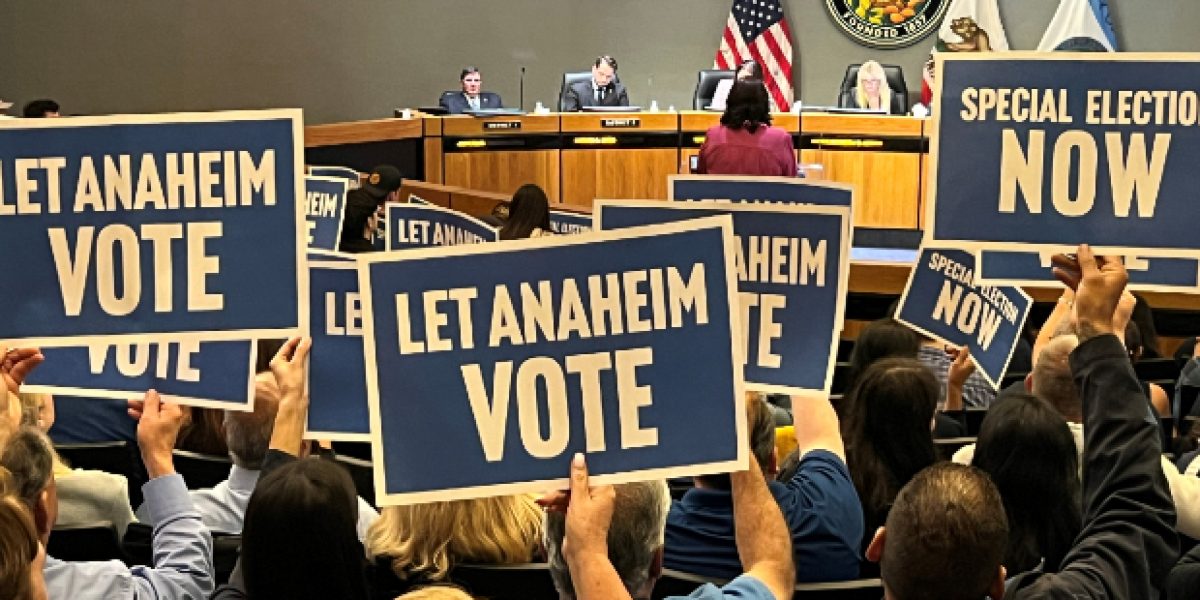UNITE-HERE Local 11 is suing the City of Anaheim and the Orange County Registrar of Voters in hopes of stopping an October 3 special election to decide the fate of Measure A – the costly wage-and-work-rules initiative that UNITE-HERE qualified for the ballot.
The petitioners are Barbara Standley (a UNITE-HERE member and Local 11 “contract enforcer”), Adalgisa Jones and Veronica Chavez – both of whom are salaried Local 11 organizers. The militant hotel workers unions unsuccessfully lobbied the Anaheim City Council to either immediately adopt its initiative as an ordinance or place it on the November 2024 – a higher turnout election union leaders believe is more favorable to Measure A’s passage.
Instead, the council voted 5-2 at its June 13 meeting to schedule the measure for a special election – originally set for September 12. According to experts, Measure A will have devastating economic and financial impacts on Anaheim employers and the city budget, and the council majority expressed a desire for voters to decide the matter as quickly as possible and in a voting environment uncluttered by other election contests.
However, the council action wasn’t in the form of an already-written resolution and the OC Registrar of Voters told the city it would need more time. The necessary resolution was adopted at the June 27 city council agenda, but the two-week delay pushed the special election to October 3.
UNITE-HERE contends the council’s action was illegal and is asking the court postop the city and the Registrar “from taking any action to present the Initiative to voters of the City of Anaheim at the October 3, 2023 special municipal election” and “such further relief as the Court deems necessary, just and proper.”
The case has been assigned to Superior Court Judge Nathan Scott, a Democrat who was appointed by Governor Jerry Brown in 2012.
The city disputes the hotel worker union’s claims.
“We stand by our action and see this lawsuit as unnecessary,” said city spokesman Michael Lyster.
“Measure A holds significant impacts for our city and our larger visitor economy. An Oct. 3 special election allows voters to weigh in as soon as possible with plenty of time to learn more about the measure and where and how they can vote,” said Lyster.
If passed, Measure A would require all Anaheim hotels and event centers (as defined) to pay a $25 minimum wage, while imposing work rules that dramatically reduce the room square footage hotel workers can clean before having that wage doubled to $50 for the entire shift. It also exposes hotels and event centers to lawsuits for any violation of Measure A’s provisions.
Affected businesses would have only 10 days to implement Measure A’s provisions if it passes, or risks fines and lawsuits.
Critics lambaste Measure A as poorly drafted and overly-broad: for example, Linbrook Bowl and Camelto Golfland would be considered “event centers” according to Measure A’s definition.
The city estimates it would cost the city budget $90 million over 10 years.
A broad coalition of hotels and small business owners, employees, residents and public safety groups have formed a coalition to oppose Measure A.
At the June 13 council meeting, UNITE-HERE Local 11 Co-president Ada Briceno demanded the council place Measure A on the November 2024 ballot because it would have the highest turnout, claiming that not doing so would “disenfranchise” voters. Briceno’s demand was echoed by other Locall 11 members and staff.
Earlier this week, at the Long Beach City Council’s July 11 meeting, UNITE-HERE members were singing off a different song sheet.
That night, the council was voting on conducting a “labor market analysis” of hospitality worker wage rates – the first step in the council putting a Local 11-backed initiative on the ballot that would raise hotel worker’s minimum wage to $25 in 2024, escalating to $30 by 2028.
The Long Beach City Council can place it on either the March 2024 or November 2024 ballot. While November would have higher turnout, UNITE-HERE wants Long Beach to put it on the March 24 ballot.
“Please place it on the next election that is programmed, in order to guarantee the necessary [wage] increase starts as soon as possible,” a Local 11 told Long Beach councilmembers.
The councilmembers themselves premised their discussion on a shared desire to heed UNITE-HERE’s preference and place it on the March 2023. Mayor Rex Richardson, for example, said he wanted it on the March 2024 ballot because a healthcare worker “living wage” measure is also on the ballot – a remark that was met with applause from the throng of Local 11 members in the council chamber.


